Fleet Management Software Development Guide and Benefits


Fleet management is a complicated process that requires many factors to consider. For example, managers need to control the fuel consumption, routes, condition of vehicles, and many other crucial details for every vehicle in their company.
It turns into a nightmare in the case of manual freight management. The only reliable solution is a fleet management system (FMS).
All the fleet management software benefits help the market to evolve at a high pace. According to recent research, the market is expected to grow to $67.4 billion in 2029.
Check out the fleet management market statistics.
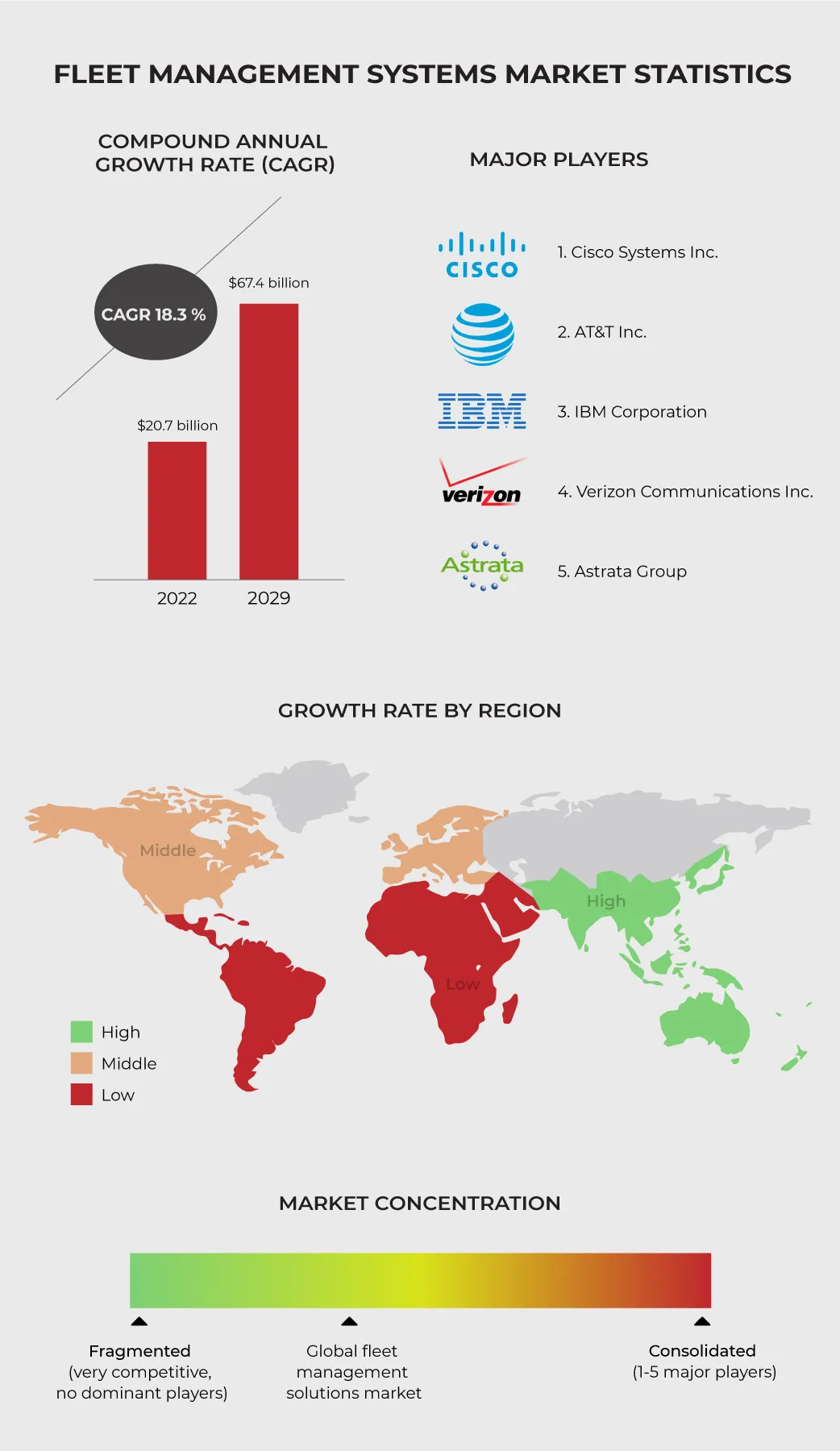
What Is A Fleet Management System
A fleet management system is a type of software that helps dispatch managers optimize many processes by integrating automation into their businesses. An FMS can collect, store, share, and analyze large amounts of data to present them conveniently. Live-time GPS vehicle tracking is one of the primary benefits of fleet management systems.
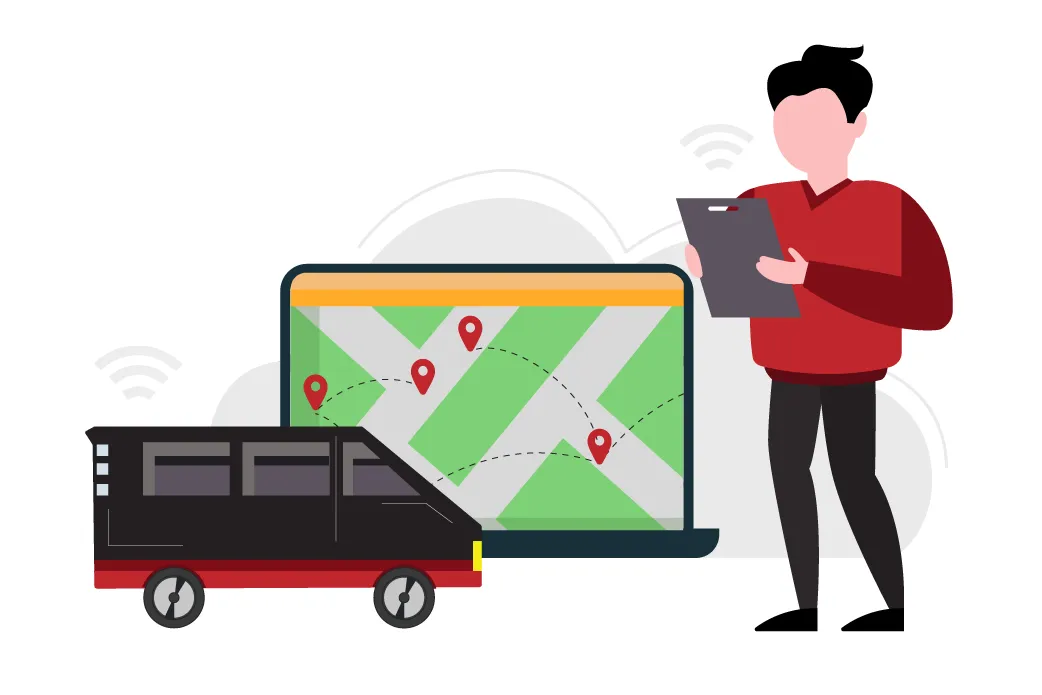
Usually, FMSs have a form of integrated systems and need to install additional electronic components in vehicles to gather data. All the data is transferred to a company’s server so managers can get valuable insights on cars in a few clicks.
Besides, FMSs can help freight managers gather and use a lot of external information about bills, tolls, inspection status, fuel costs, etc.
Fleet management software can help business owners overcome the following challenges:
- Unoptimized routes
- Inefficient gas consumption
- Low customer satisfaction
- Driver’s fraud and cargo theft
- Poor fleet management
- Rowdy drivers’ behavior
- Lack of data on the condition of vehicles
There are two types of feet management systems:
- Out-of-the-box — Ready-made solutions that have a predetermined set of fleet management software features, like GPS vehicle tracking or remote vehicle maintenance. A ready-made solution can be easily installed and set up.
- Custom — Well-tailored digital solutions that are designed and created by software engineers, following all the client’s instructions.
Looking for a reliable partner to develop a a custom FMS from scratch?
CodeIT team is the right choice!
Many types of companies and organizations order fleet management software development to streamline business processes, cut operating costs, and improve customer service. The top companies operate in the following areas:
- Transportation — Companies involved in transporting passengers. They are taxis, ride-sharing services, public transportation companies, and others.
- Field services and construction — Companies that offer handyman, construction, or on-demand services and have a lot of vehicles that need to be managed.
- Financial — Banks and other financial organizations that use vehicles for cash-in-transit
- Cargo and delivery — Organizations that have a lot of trucks to transport cargo and deliver products to stores.
- Security and medical service — Firms that offer security services and hospitals that have a lot of vehicles.
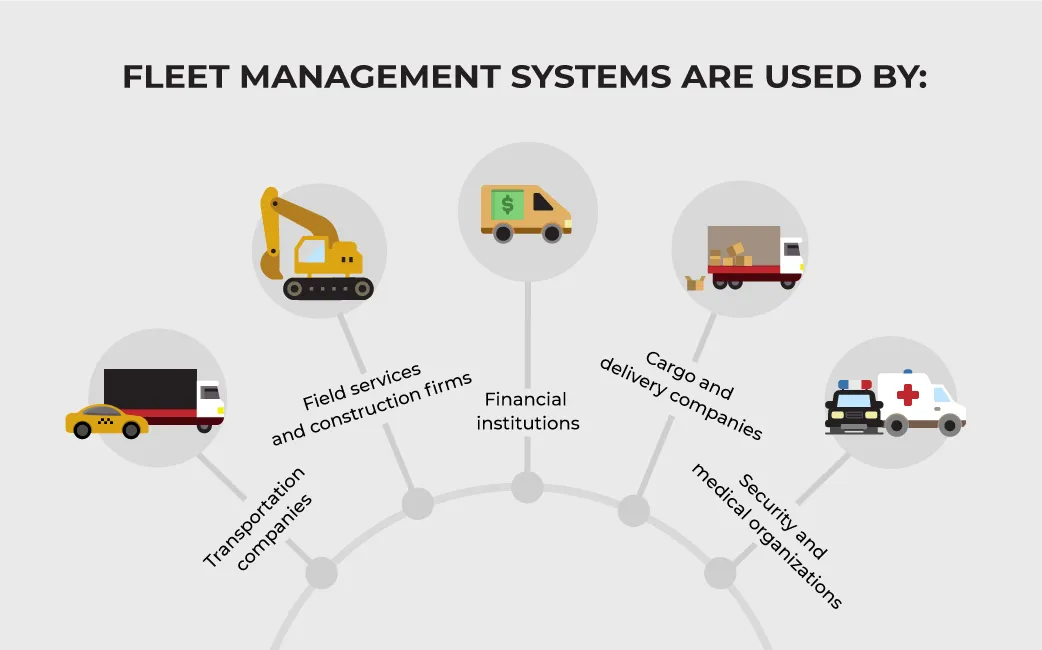
Top 6 Benefits Of Fleet Management System
Fleet management systems can help organize and coordinate vehicles with the help of smart route planning. The fleet management software features help facilitate trucks’ maintenance, cargo management, drivers’ monitoring, etc. Also, they can help increase efficiency, enhance security, and reduce operating costs.
Nevertheless, there are a lot of other benefits of a fleet management system for different companies and organizations. They are the following:
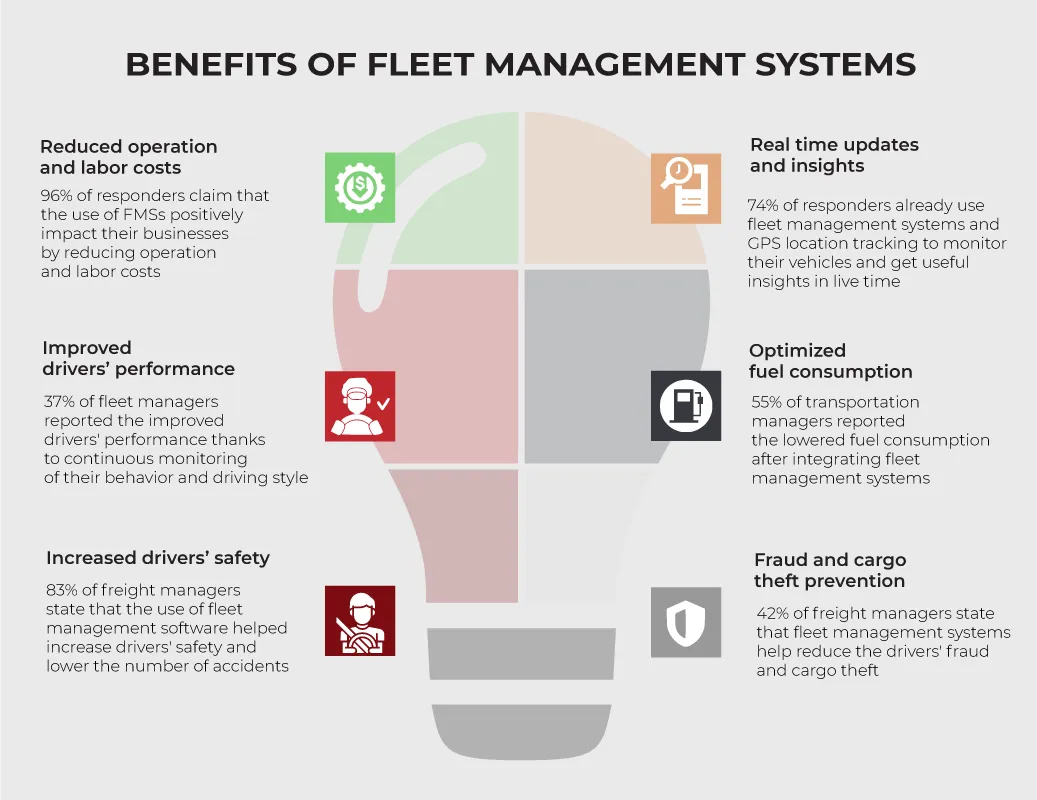
1. Reduced Operation and Labor Costs
Fleet management systems help optimize a lot of processes and get valuable insights. Consequently, 96% of responders report a positive impact on business operations after integrating an FMS. Most responders claim that one of the primary fleet management software benefits is reduced operation and labor costs.
2. Improved Drivers’ Performance
37% of responders report that the thorough analysis of gathered information helped increase the drivers’ performance. For example, a fleet management system can help monitor the driver’s style of driving, routes, engine idling time, harsh acceleration and braking, etc. Also, it can help build the most optimal routes to avoid traffic jams.
3. Increased Drivers’ Safety
83% of dispatchers state that FMSs increase the safety of drivers significantly. They report a reduced number of accidents thanks to thorough monitoring of vehicles and drivers.
A fleet management system can help provide on-time inspections and get vehicle maintenance alerts in live time. Besides, cameras installed in cabins help monitor drivers’ alertness, fatigue, and concentration.
4. Real-Time Updates and Insights
Real-time fleet vehicle monitoring is one of the essential fleet management software features. The integration of telematics has already helped 74% of fleet owners start monitoring the location of drivers, condition of vehicles, performance, and other factors.
Real-time updates help dispatch managers respond quickly to any possible issues that appear. It can help reduce fleet downtime. For example, managers can get updates on the need to replace any parts of a vehicle to order them simultaneously.
5. Optimized Fuel Consumption
55% of business owners claim that fleet management systems helped lower fuel consumption. FMSs can offer the most optimal routes, suggest driver behavior improvements, and monitor tire pressure. Proper tire pressure management can help reduce gas consumption by 10% and increase the lifecycle of tires.
6. Fraud and Cargo Theft Prevention
Transportation businesses may face issues with driver fraud and even cargo theft. According to a recent survey, 42% of business owners noticed the lowered number of safety incidents and fraud cases after integrating a fleet management system. Safety-focused fleet management software features can help monitor all the expenses of drivers and cargo door locks remotely.
Having extensive expertise, we can help build a well-tailored fleet management solution.

Business First
Code Next
Let’s talk
How Fleet Management Systems Work
A fleet management solution is an integrated system that can use different devices and software to gather data about vehicles and securely transfer it to freight managers. Check out how it works in a nutshell.
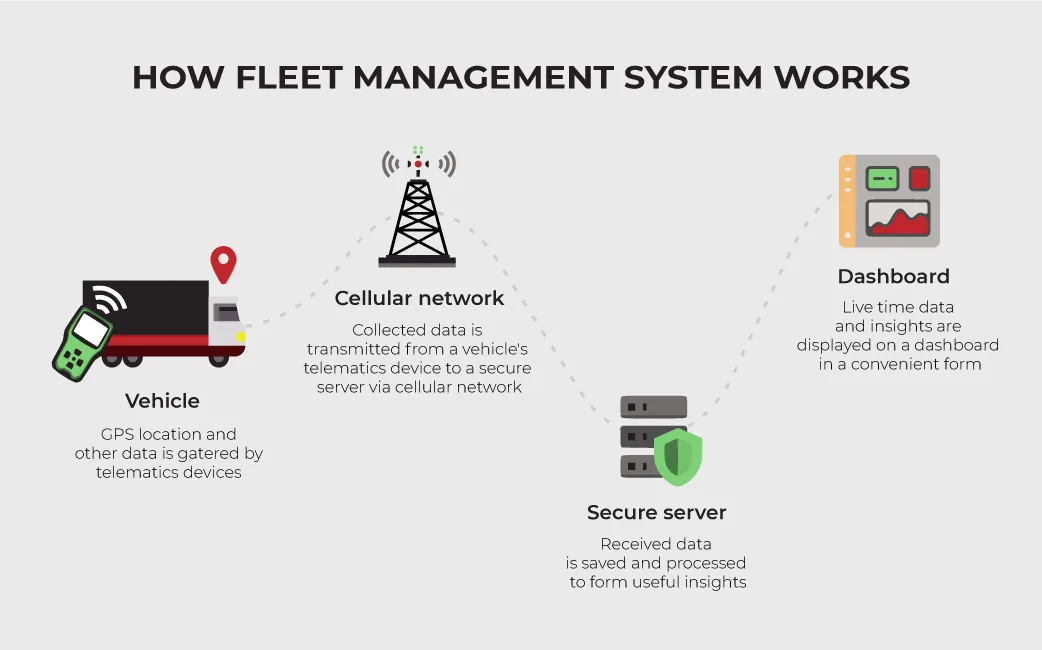
Four significant stages describe the way FMSs work:
- Telematics devices gather GPS location and additional information about vehicles’ and drivers’ conditions.
- All the data is transmitted to a secured server using a cellular network.
- The received information is processed according to developed algorithms to deliver useful insights.
- Transportation managers access a dashboard that displays all the information in a convenient way.
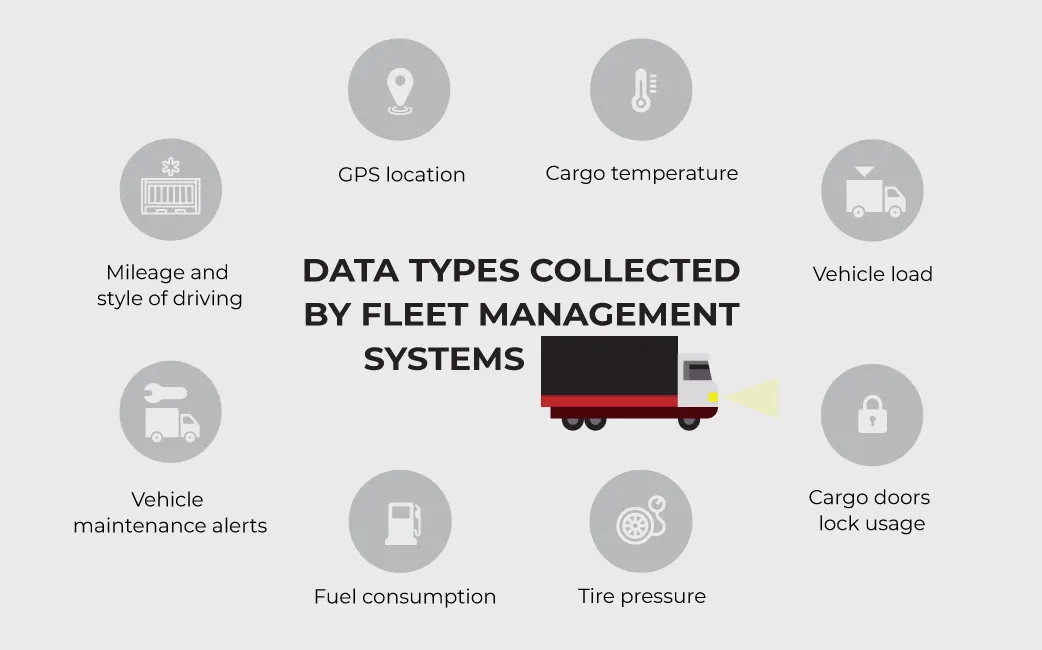
Telematics devices can be used to collect the following information:
- GPS location
- Drivers’ performance and condition
- Fuel consumption
- Vehicles’ maintenance alerts
- Cargo doors lock usage
- Tires pressure
- Vehicle load
- Cargo temperature
Types Of Telematics Devices
There is no one-size-fits-all telematics device for gathering and sharing information. The top types of telematics devices are the following:
- Black box — This type of device is installed in a vehicle securely. It gathers basic trip information, saves, and shares it via a cellular network. Insurance companies widely install black boxes to get information about driving patterns and car crashes.
- Bluetooth-powered — This type of telematics device is represented by an external gadget that connects to a vehicle’s center console via Bluetooth. It gathers information about trips and sends it to a server using cellular connectivity.
- Smartphone-based — A solution that uses smartphones to collect and share information. Mobile apps help gather information about cars’ location, mileage, hours of driving, breaks, and other crucial details. By creating a location-based app, business owners can eliminate the need to install onboard telematics devices.
- OBD-II (onboard diagnostics) port devices — The OBD-II port is installed on all trucks and most cars. It grants access to all the diagnostic information collected by a vehicle.
- Dashcams — A dashboard camera with an inbuilt GPS module and cellular connectivity. Fleet dash cameras can help capture traffic and monitor drivers’ conditions. Advanced models with AI and ML can detect traffic rules violations, dangerous driving habits, drivers’ sleepiness, or phone usage.
- 12v plug-in devices — This type of device has a form of an external box that plugs into a 12v outlet. It has inbuilt sensors and a GPS module to track and transmit information about trips.
- OEM telematics — These days, most cars have a lot of inbuilt sensors. OEM hard-wired telematics devices offer the opportunity to fetch data from default vehicles’ sensors and send them to secure servers.
It is worth noting that all types of telematics devices need to have a SIM card installed to have cellular connectivity for sending and receiving data in live time.
Create a cross-platform application for managing your fleet with CodeIT

Business First
Code Next
Let’s talk
Guide On Fleet Management Software Development
Creating a well-tailored fleet management solution is a complicated process that implies a lot of stages. Let’s dive deeper and discover how to develop an FMS.
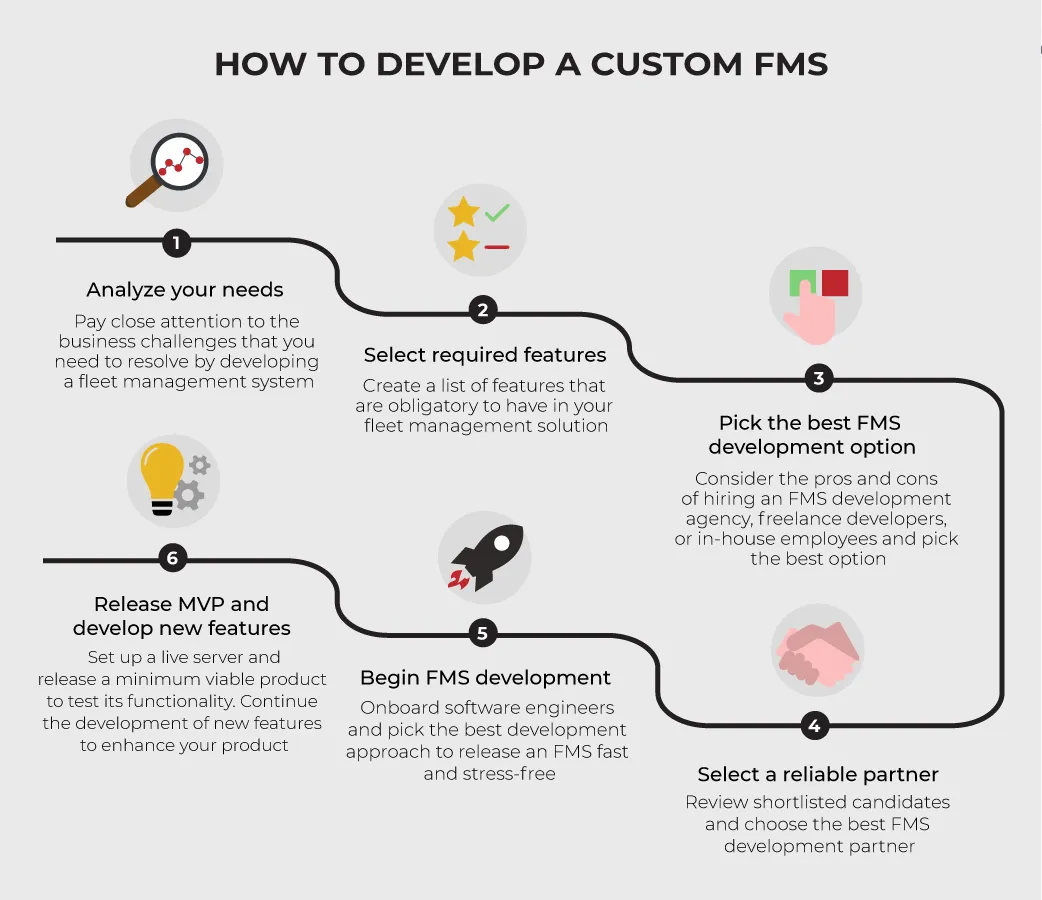
1. Analyze Your Needs
For starters, you should understand what you need clearly. It’s recommended to gather as many details about your business as possible. Then, you should analyze the current problems that need to be resolved by developing and integrating a fleet management system. Also, note the points you want to improve in your company.
2. Select Required Features
Having defined business goals, you should form precise requirements for developers. They need to imply information about the current and expected fleet to develop a stable system capable of processing large amounts of data.
Also, it’s obligatory to define all the fleet management software features that your solution should have. It will help developers estimate your project and form a backlog of tasks.
Key features of a fleet management system
Creating a list of features may be a challenging task. Feel free to explore the core fleet management software features to get some ideas.
- GPS location tracking — Live time tracking is essential for all fleet management solutions. It helps monitor vehicles’ location, speed, routes, and stops. Meanwhile, it helps get useful statistics on trips’ duration, average speed, and other insights.
- Drivers’ performance monitoring — To increase customer satisfaction and lower bills, drivers should have a high performance. Thorough tracking helps dispatchers understand drivers’ performance and discover helpful information on how it can be improved.
- Live time fleet alarms — A large number of unexpected issues can happen. Dispatchers can get real-time alerts thanks to many onboard sensors and continuous cellular connectivity. For instance, they can receive information about unauthorized cargo doors unlocking, engine failure, unfastened seat belts, low tire pressure, and other crucial alerts.
- Fuel consumption monitoring — Gas is one of the most significant fleet expenses. Therefore, it’s vital to monitor fuel consumption thoroughly. It is one of the core fleet management software features that can help identify driving patterns to understand how to increase fuel efficiency.
- Engine idling monitoring — The thorough monitoring of engine idling helps optimize gas consumption and meet local anti-idling regulations.
- Tires pressure monitoring — By maintaining the required tire pressure, drivers can optimize fuel consumption to lower gas bills. Live time insights can help fleet managers monitor the pressure in tires hassle-free.
- Route planning — To avoid traffic jams, an FMS should be capable of analyzing different routes and suggesting the most optimal way to deliver goods on time and save fuel.
- Regular inspection notifications — Regular car check-up helps keep vehicles in good condition and minimize the risk of failure. Notifications can help fleet managers not to miss regular inspections.
- Remote diagnostics monitoring — It is one of the top fleet management software features that help freight managers conduct preventative maintenance to reduce fleet downtime. In case of a technical issue, fleet managers can get an alert simultaneously to update a driver’s schedule and order the required items to fix the problem.
- Real-time data on a dashboard — It’s hard to manually process large amounts of raw data collected by telematics devices. To facilitate the work operations of fleet managers, an FMS should process raw data and provide helpful insights on a dashboard.
3. Pick Best Fleet Management Software Development Option
There are three options available to develop a fleet management solution:
- Hire a freelancer
- Hire a team of in-house developers
- Delegate FMS development to an agency
Every option has its advantages and drawbacks that have to be considered. Check out the key differences between the available options to choose the most suitable one.
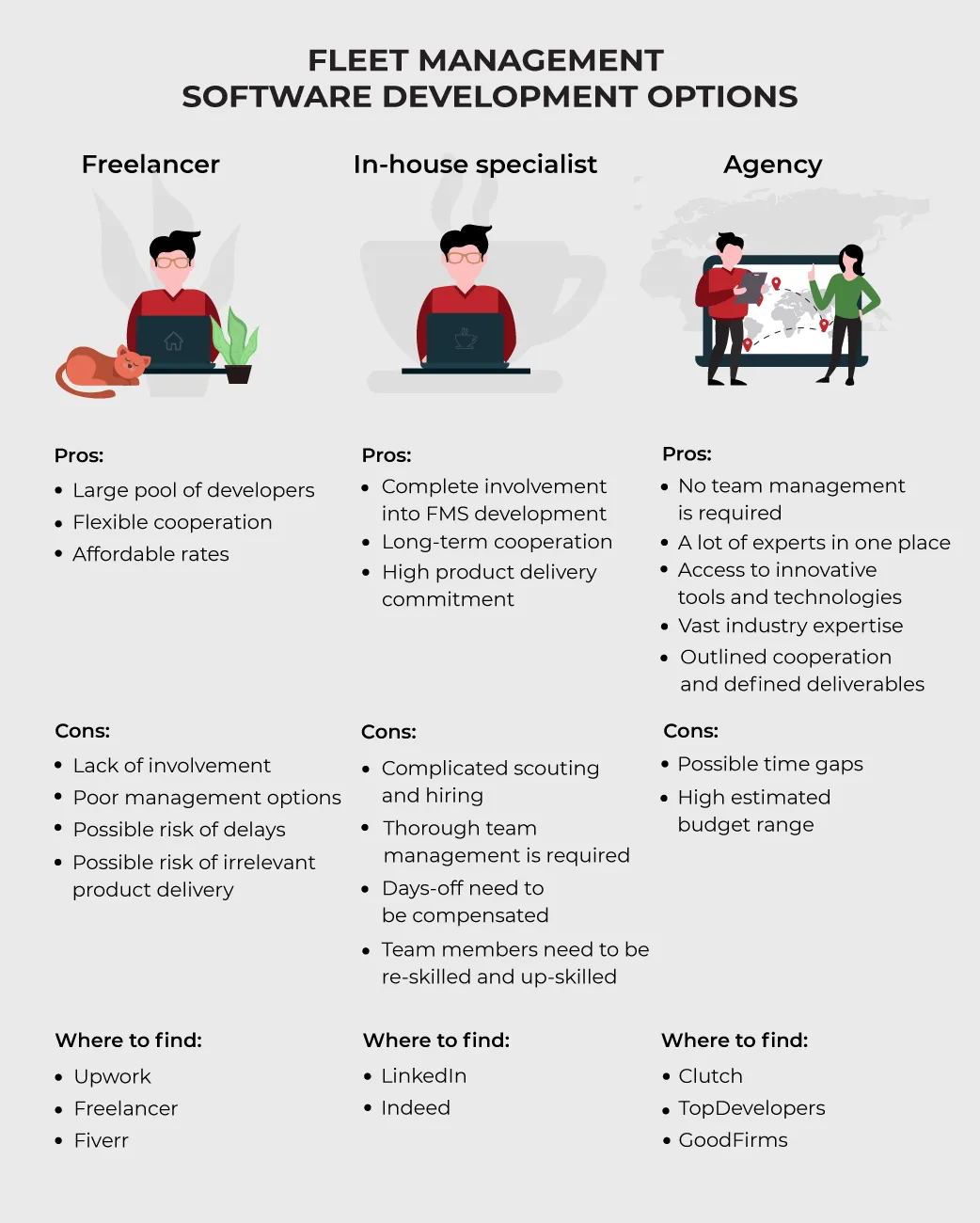
Freelance developers
Freelancers are independent contractors who get hourly- or project-based compensation. They usually have a free schedule and have a low task completion commitment. Here are the advantages and drawbacks of hiring a freelancer to develop a fleet management system.
| Pros | Cons |
|---|---|
| Large pool of developers | Lack of involvement |
| Flexible cooperation | Poor management options |
| Affordable rates | Possible risk of delays |
| Possible risk of irrelevant product delivery |
Where to find freelance developers
You can easily find freelance FMS developers on popular platforms like Upwork, Fiverr, or Freelancer. Such websites offer the opportunity to find and assess a large number of developers’ profiles and hire them directly. The top freelance platforms take the middleman role to keep both parties satisfied.
In-house team of developers
It’s required to invest a lot of time and money into scouting, recruiting, and onboarding to hire a team of skilled in-house developers. Also, it’s needed to manage a team of in-house specialists meticulously. However, you can be completely involved in all the fleet management software development processes with an in-house team.
Feel free to discover all the advantages and disadvantages of hiring an in-house team below.
| Pros | Cons |
|---|---|
| Complete involvement in FMS development | Complicated scouting and hiring |
| Long-term cooperation | Thorough team management is required |
| High product delivery commitment | Days-off need to be compensated |
| Team members need to be re-skilled and up-skilled |
Where to find in-house developers
The most reliable way to find in-house software engineers is to establish a human resources (HR) department responsible for scouting and hiring new employees. In case you don’t have an HR department in your company, there is an option to delegate this task to external recruiters or hire a dedicated development team.
Otherwise, you can find in-house employees on popular websites like LinkedIn or Indeed to find in-house specialists by yourself.
FMS development agency
There are a lot of software development companies that have expertise in building digital solutions for the logistics industry.
Hiring an external agency can delegate the entire fleet management software development process to a skilled expert and eliminate stress. A software development company will deliver a ready-to-use fleet management system that matches all the requirements.
Here are the pros and cons of hiring a software development company.
| Pros | Cons |
|---|---|
| No team management is required | Possible time gaps |
| A lot of experts in one place | High estimated budget range |
| Access to innovative tools and technologies | |
| Vast industry expertise | |
| Outlined cooperation and defined deliverables |
Where to find a software development agency
There are many different options for finding a trusted software development agency. You can use Google search or ask your connections for a reference.
Nevertheless, the most reliable options are to explore B2B listing and freelance platforms. Clutch, TopDevelopers, and GoodFirms are the top sites that offer the opportunity to find top-rated fleet management software development firms and learn more about them. Also, you can explore Upwork, the biggest freelance platform, to find popular firms and read reviews submitted by real clients.
Learn more about our expertise in the logistics industry
4. Select Partner
After creating a list of potential candidates to hire, you should assess them to select the best one. In order not to fail with choosing a partner, it’s advisable to check the following:
- Technical expertise — Ensure that a potential partner has the required experience to develop a fleet management system. Feel free to ask for any documents and certificates that prove technical expertise. Also, you can hire experienced specialists to conduct a tech interview or use third-party services that help assess the technical skills of applicants.
- Products developed — To pick the best FMS development provider, examine the product completed by a potential partner. It will help you understand if they are capable of delivering innovative solutions in the industry.
- Approximate budget range — Estimation is crucial for selecting a top-tier tech partner. It would be best to calculate the approximate budget range for building the solution you need.
- Deadline — Depending on the number of resources allocated to your project, you can estimate the approximate time that will be required to release an MVP and a fully-functioning product.
- Reference letters or reviews — If you use a freelance platform or a B2B listing to find a tech-strong fleet management software development partner, don’t be shy about reading reviews submitted by previous clients to get familiar with all the advantages and drawbacks of cooperating with a certain firm. In the case of hiring an in-house employee, feel free to ask applicants to share reference letters.
When you select the best partner, signing an agreement to outline your cooperation is recommended. Also, don’t forget about signing the non-disclosure agreement (NDA) to keep all the confidential information safe.
5. Begin FMS Development
The development stage requires you to onboard software engineers, so they can start building all the required fleet management software features. The primary aim of onboarding is to help software engineers learn more about your business goals and technical requirements to develop an FMS that matches all your needs.
It’s recommended to pick a software development approach. In case you want to establish an effective product development process and avoid bottlenecks, it’s advisable to choose the Agile methodology. An experienced manager should control the FMS development process. Also, it implies code review and acceptance testing.
6. Release MVP and Develop New Features
A minimum viable product is the first increment that should be released. In essence, an MVP is the first version of your FMS. It should imply the crucial features to test how your fleet management system works.
Next, you should develop new features to enhance the existing product. If you don’t know what extra features of a fleet management system need to be developed, feel free to keep up with recent trends.
Recent trends in fleet management software
These days, fleet management systems are feature-rich. However, the development of modern technologies helps establish new trends in fleet management. The top ones are the following:
- Improved safety — By installing a lot of sensors in vehicles and connecting them to fleet management systems, freight managers can enhance driver safety, which is one of the most valuable benefits of a fleet management system. For instance, sensors can measure the distance to other objects and notify drivers about collision risks. Also, FMSs can help fleet managers track the usage of seat belts by drivers.
- Shop integrations — With the help of store integrations, fleet managers can prevent fraud and make money spending more transparent. For instance, a shop integration can help drivers get the required items at the nearest stores upon need. All the goods purchased get reviewed and paid for by a fleet manager using the corresponding software.
- Third-party services integration — The application programming interface (API) is viral nowadays. It helps seamlessly integrate third-party services into the existing software. It can help extend the functionality of FMSs significantly.
- Drivers’ behavior analysis with dashcams — The combination of dashcams and artificial intelligence (AI) can help monitor and analyze drivers’ behavior automatically. For instance, dashcams can help analyze drivers’ sleepiness and distractions to enhance safety.
- Electrical vehicle fleet management — The world is switching to using electrical vehicles (EVs) at a high pace. Moreover, fleets of small cars that drive short distances can cut their bills significantly by using electric vehicles. The functionality of FMSs needs to be adjusted to help EVs fill their batteries without compromising the overall performance of fleets.
Fleet Management Solution Examples
There are many out-of-the-box fleet management software available on the market. Here are the top-three solutions available.
Fleetio
It is a cloud-based fleet management system that helps automate many processes. It also supports mobile devices. The feature-rich FMS allows monitoring a lot of details to help fleet managers stay updated about everything that should be done. Also, it offers the opportunity to integrate a lot of third-party services.
The Fleetio key features are the following:
- GPS tracking devices and telematics integration
- Roles and permissions systems
- Developer API
- Fleet dashboard
- VIN decoding
Onfleet
It is a popular fleet management solution that helps both small and large businesses deliver goods on time. The system aims to streamline operations by offering AI-based automated services and rich communication options.
The core features of Onfleet are the following:
- Route optimization
- Auto-assign
- Automatic status updates
- Data-driven reports
- Proof of delivery
Samsara
This FMS is one of the cloud-based solutions that have a large assortment of helpful fleet management software features, like route optimization, GPS fleet tracking, and remote vehicle maintenance alerts. Samsara is a system that uses AI and real-time monitoring to facilitate fleet management. Also, it helps integrate a lot of third-party services to build large-scale integrated fleet management solutions.
The key features of Samsara are the following:
- AI safety programs
- Real-time visibility
- Fleet electrification
- App marketplace
- Driver workflows
Custom Fleet Management Software Vs Ready-made
Custom fleet management software development is usually the best option for business owners because of its many benefits over ready-made solutions. It offers outstanding flexibility and a lot of space in a room for further innovations.
Check out the comparison of custom-made and out-of-the-box FMSs below.
| Custom FMSs | Ready-Made FMSs | |
|---|---|---|
| Custom user interface | You can create any type of FMS user interface and customize a dashboard according to your needs. | User interfaces of ready-to-use FMSs are pre-defined. Some providers offer the opportunity to adjust the dashboard. |
| Specific business goals | With custom fleet management software development, you can create a product that helps you meet all the business goals. | You must conduct thorough research to find an FMS that matches your needs. Otherwise, you will need to compromise on your business goals. |
| Scalability | Custom-made fleet management software can be easily scaled up. You can add new features and new vehicles to your fleet. | Most ready-made solutions can hardly be scaled up. Clients must pay extra fees to add new vehicles and managers to their fleet management system. New features can be released by an FMS provider only. |
| Cost | The cost of a fleet management solution depends on the number of fleet management software features required to develop and other factors. It is a one-time payment. | Some companies offer the one-time FMS purchase option. However, most FMS providers charge recurring payments that depend on the number of features available, drivers, and managers. |
| Integration | Complete flexibility allows the integration of many third-party services into a custom fleet management system. | A fleet management software provider limits the number of services available to connect. |
| Time to start | A well-tailored custom fleet management solution can help onboard new fleet managers fast. | Some ready-made solutions need to invest a certain amount of time in staff training. |
| Control | Being a custom FMS owner, you have complete control over your system and access to source code. | Users of ready-made solutions have limited control over FMSs. In most cases, there is no option to access source code or adjust the interface. |
Wrapping Up
Fleet management software is the top solution that helps business owners manage many vehicles seamlessly. It helps increase drivers’ performance, monitor their behavior, reduce operating costs, audit the condition of cars remotely, and get helpful insights in real time. Nevertheless, there are a lot of extra benefits of fleet management software.
Business owners who want to integrate a fleet management system can choose between ready-made and custom solutions. An FMS developed from scratch offers the opportunity to have complete control over a solution developed, create a personalized user interface, add any fleet management software features, and enhance functionality by adding any integrations.
FAQ
An FMS is a comprehensive solution that helps streamline fleet management. The primary purpose of an FMS is to optimize spending, drivers’ performance, and enhance customer experience.
Fleet management systems have a lot of features that help solve various problems. The essential fleet management software features are the following:
- GPS location tracking
- Drivers’ performance monitoring
- Live time fleet alarms
- Fuel consumption monitoring
- Engine idling monitoring
- Tires pressure monitoring
- Route planning
- Regular inspection notifications
- Remote diagnostics monitoring
- Real-time data on a dashboard
Fleet software engineering is the process of developing a fleet management system. It is a complicated process that involves a lot of stages. It’s required to find a tech-strong partner with extensive logistics industry experience to create a top-tier fleet management system.
To develop a custom fleet management system, you need to:
- Analyze your needs
- Select required features
- Pick the best FMS development option
- Choose an FMS development partner
- Begin fleet management software development
- Release MVP and develop new features
Fleet management software can help optimize many processes and solve a lot of problems. The top ones are the following:
- Unoptimized routes
- Inefficient gas consumption
- Low customer satisfaction
- Driver fraud and cargo theft
- Poor fleet management
- Rowdy drivers’ behavior
- Lack of data on the condition of vehicles
Related services and industries
Logistics Software Development
Get solutions designed to streamline operations
Build your ideal
software today



